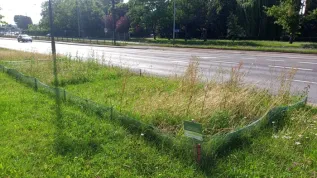Wrocław/ Scientists from the University of Life Sciences will conduct large-scale air quality research in the city

26/08/2025 update: 26/08/2025
2 minutes of reading
Over 200 volunteers equipped with specialized sensors will participate in large-scale air quality research in Wrocław, beginning in September. The analysis will be conducted by an interdisciplinary team of scientists from the Wrocław University of Environmental and Life Sciences.
The project is a continuation of earlier bicycle measurements from 2022; the undertaking is being implemented thanks to a grant from the National Science Centre in the amount of PLN 620,000, Małgorzata Moczulska, spokeswoman for the Wrocław University of Environmental and Life Sciences, told PAP on Monday.
This time, 200 volunteers will participate in the study, receiving specialized, mobile air quality sensors. These devices, slightly larger than a smartphone, will collect pollution and meteorological data for a week. The values collected by the devices will be correlated with global measurements from the Institute of Meteorology and Water Management.
- Researchers want to check whether the air we breathe in our apartment, bus, car or on the street differs and how it affects our daily exposure to harmful substances - explained a spokeswoman for the Wrocław University of Environmental and Life Sciences.
Researchers participating in this project include Professor Joanna Kamińska from the Department of Applied Mathematics at the Wrocław University of Environmental and Life Sciences. She emphasized that the Wrocław study will allow for the identification of not only pollution levels but also specific exposure scenarios, for example, related to transport choices. Participants will also keep activity diaries, which will help the research team develop an innovative exposure assessment methodology, and its code will be made available to other researchers, Professor Kamińska noted.
The professor also highlighted the phenomenon of summer air pollution in cities. The dominant form is photochemical smog, also known as Los Angeles-type smog. "It is formed as a result of chemical reactions between nitrogen oxides (NOx) and volatile organic compounds (VOCs) in the presence of strong solar radiation. These reactions produce, among other things, tropospheric ozone, aldehydes, organic aerosols, and peroxyacyl nitrates. These compounds not only deteriorate air quality but can also negatively impact health, causing headaches, eye and respiratory irritation, and even exacerbating the symptoms of heart and lung disease," the researcher explained.
Photochemical smog is characteristic of large urban areas, but it also occurs, although to a lesser extent, in smaller towns. (PAP)
Science in Poland
pdo/ bar/
The PAP Foundation permits free reprinting of articles from the Nauka w Polsce website, provided that you notify us by email once a month of your use of the website and cite the source of the article. On portals and websites, please include the linked address: Source: naukawpolsce.pl, and in journals, please include the annotation: Source: Nauka w Polsce website - naukawpolsce.pl. This permission does not apply to information in the "World" category or any photographs or video materials.
Before adding a comment, please read the Forum Rules of the Nauka w Polsce website.
Dear Reader, In accordance with the Regulation (EU) of the European Parliament and of the Council of 27 April 2016 on the protection of natural persons with regard to the processing of personal data and on the free movement of such data, and repealing Directive 95/46/EC (General Data Protection Regulation), we hereby inform you about the processing of your data. The data controller is the PAP Foundation, with its registered office in Warsaw at ul. Bracka 6/8, 00-502 Warsaw. This data is collected as part of your use of our services, including websites, services, and other functionalities provided by the PAP Foundation, primarily stored in cookies and other online identifiers installed on our websites by us and our trusted partners of the PAP Foundation. The collected data is used solely for the following purposes: • providing services electronically • detecting abuses in services
• statistical measurements and service improvement
The legal basis for data processing is the provision and improvement of services, as well as ensuring security, which constitutes the legitimate interest of the controller. Data may be shared, at the request of the controller, with entities authorized to obtain data under applicable law. Data subjects have the right to access, rectify, and erase data, and to restrict their processing. They may also withdraw consent to the processing of their personal data.
Please send all notifications regarding personal data protection to [email protected] or in writing to the PAP Foundation, ul. Bracka 6/8, 00-502 Warsaw, with the note "personal data protection"
More information about the processing of personal data and your rights can be found in the Privacy Policy. Learn more. I consent
naukawpolsce.pl






